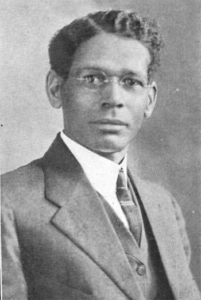
George Haynes
*The birth of George Haynes in 1880 is marked on this date. He was a Black social worker and educator.
He was born in Pine Bluff, Arkansas. After completing his elementary education in the local schools, his mother moved with him and his sister, Birdie, to Hot Springs, which offered Blacks better educational, social, and vocational opportunities. His mother instilled in him a desire for self-improvement and a belief in formal education to escape poverty and discrimination. Her support, curiosity, and ambition prompted him to pursue a college degree.
A visit to Chicago in 1893 gave Haynes additional encouragement. In Chicago, he encountered a closer-knit Black community that engaged in stimulating intellectual conversations about migration, emigration, and other contemporary issues affecting blacks. Haynes completed a year of high school-level courses at the Agricultural and Mechanical College in Normal, Alabama, followed by another year of college preparation at the academy at Fisk University in Nashville, Tennessee, where he obtained his bachelor's degree in 1903. He won a scholarship to Yale Graduate School, where he earned his master's degree in sociology within a year, waiting tables and stoking furnaces to pay his living expenses.
While studying at the University of Chicago in 1906 and 1907, Haynes became interested in social problems affecting black migrants from the South. This interest led him to the New York School of Philanthropy, from which he graduated in 1910. Two years later, he received a Ph.D. from Columbia University. Columbia University Press published his doctoral dissertation, The Negro at Work in New York City. Earlier, while still a graduate student, he had been secretary of the Colored Men's Department of the International Committee of the YMCA. During that time, he visited Black colleges and encouraged students to achieve educational excellence and to help their schools set high academic standards.
Within this period, he also involved himself in the activities of the American Association for the Protection of Colored Women, the Committee for Improving the Industrial Conditions of Negroes in New York, and the Committee on Urban Conditions Among Negroes. He was instrumental in merging these groups into one organization, named the National League on Urban Conditions Among Negroes (NLUCAN), the forerunner of the National Urban League. He served as its executive director from 1911 to 1918.
He also established the Association of Negro Colleges and Secondary Schools and served that organization as secretary from 1910 to 1918. He also helped the New York School of Philanthropy and NLUCAN in collaborative planning that led to the establishment of the first social work training center for black graduate students at Fisk, and he directed that center from 1910 to 1918. He supervised field placements of League fellows at the New York School and was a professor of economics and sociology at Fisk.
On leave from Fisk from 1918 to 1921, he served as Director of Negro Economics at the United States Department of Labor. Here, he was involved in matters of racial conflict in employment, housing, and recreation. He continued his earlier studies of the exclusion of black workers from certain trade unions, interracial conditions in the workplace, and child labor. These studies resulted in numerous scholarly works. One of the most significant of these was The Negro at Work During World War I and During Reconstruction.
The work's widespread and profound impact resulted in his appointment as a member of the President's Unemployment Conference in 1921. In 1930, he surveyed the work of the YMCA in South Africa, and in 1947, he conducted a similar study of the organization's activities in other African nations. These efforts resulted in his being chosen as a consultant on Africa by the World Committee of YMCAs. His book, Trend of the Races (1922), reflected his belief in the union of all people. Over the last nine years, he taught at the City College of New York and served as an American Committee on Africa officer. Dr. Haynes died in New York City on January 8, 1960.